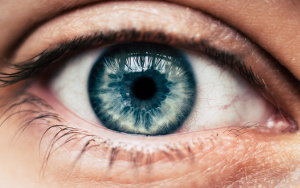Supplements with Q10 and other antioxidants for common eye diseases
 The blood supply to the retina of the eye is crucial for good vision. For that reason, experts recommend taking antioxidant supplements against eye diseases caused by an impaired blood supply to the retina. Although there is lacking evidence for the effectiveness of such supplements it appears now that Q10 and other antioxidants may improve vision when used in combination with conventional therapies, according to a Spanish study that is published in Nutrients. Because the body has difficulty with absorbing Q10 from supplements it is important to choose a supplement that has good bioavailability.
The blood supply to the retina of the eye is crucial for good vision. For that reason, experts recommend taking antioxidant supplements against eye diseases caused by an impaired blood supply to the retina. Although there is lacking evidence for the effectiveness of such supplements it appears now that Q10 and other antioxidants may improve vision when used in combination with conventional therapies, according to a Spanish study that is published in Nutrients. Because the body has difficulty with absorbing Q10 from supplements it is important to choose a supplement that has good bioavailability.
Eye diseases that are caused by local circulatory disturbances and result in sudden loss of vision are very common. The local circulatory disturbances may affect the blood flow to the retina, the optic nerve, and other areas, and it can lead to lesions in those nerve branches that connect with the visual cortex of the brain.
The eye disease known as non-arteritic anterior ischemic optic neuropathy or NAION occurs in the small blood vessels that are situated in the front part of the optic nerve. Symptoms include acute loss of vision and various visual impairments, depending on how large a part of the optic nerve is affected. There is no conventional therapy with a documented effect and there is a 15 percent risk that the other eye will also be affected within a five-year period.
Retinal artery occlusion (RAO) is caused by a blockage in one or several of the arteries that lead to the retina. This blockage may be partial or total and the extent and spread of the vision loss depends on whether it is the central artery or its connecting branches that are blocked.
Quadrantanopia is characterized by a 25% loss of vision field. The disease can be caused by lesions of the brain lobe.
The different eye diseases affect our ability to carry out a wide array of daily activities such as walking, using tools, reading, and driving. They also increase our risk of accidents and make us more dependent on help from our surroundings.
|
Eye diseases, oxidative stress, and antioxidants
The risk of getting one or several of the different eye diseases increases with age. Other risk factors include smoking, type 2 diabetes, hypertension, atrial fibrillation, lesions, stroke, and cataracts. A very common cause is atherosclerosis and ageing, smoking, and type 2 diabetes are known to increase the risk. Atherosclerosis is caused by deposits of oxidized LDL cholesterol and calcium (plaque) on the blood vessels lining, which causes narrowing and reduced blood flow. Cholesterol, which is otherwise essential, becomes potentially dangerous when free radicals oxidize the cholesterol. It is therefore important to include antioxidants as part of the prevention and treatment of these eye diseases.
Coenzyme Q10 has created quite an interest among scientists. First of all, Q10 is a vital part of the cellular energy turnover. Secondly, it is a powerful and unique antioxidant that protects the sensitive cells in the eye against oxidative stress.
Supplements of Q10 and other antioxidants can be included in the treatment
The Spanish study included 48 patients. Eighteen were diagnosed with NAION, 7 were diagnosed with RAO, 10 were diagnosed with quadrantanopia, and 13 were diagnosed with other eye diseases. All patients were given daily supplementation (100 mg) with pharmaceutical-grade Q10 together with other antioxidants such as vitamins A, B, C and E, plus zinc, selenium, manganese, lutein, and zeaxanthin.
In the course of the study that took place from 2009 to 2019, the participants’ vision was tested and analyzed. It turned out that the vision improved in all the patients during the period where they took the supplements. One patient discontinued the Q10 supplementation and that caused visual impairment. However, once supplementation was resumed the vision improved again.
According to the new study, supplementing with Q10 and other antioxidants may be relevant in the treatment of eye diseases caused by circulatory disturbances that affect the retina. It also appears that the different antioxidants are relevant in the prevention of these eye diseases. Nonetheless, the researchers call for randomized, placebo-controlled studies that can confirm their results. Such studies can provide more information such as how long the therapies should last and how Q10 works when taken alone or in combination with other antioxidants.
It is important to choose pharmaceutical-grade Q10
The quality of any given Q10 preparation is determining for the outcome of studies in which the product is used. The human body has difficulty with absorbing Q10 because the Q10 molecules tend to aggregate and form large, insoluble crystals that pass through the digestive tract instead of being absorbed. Mixing the Q10 raw material in a special oil and exposing it to a heat treatment can prevent these crystals from forming so the individual Q10 molecules are free can pass through the intestinal wall. When purchasing a Q10 supplement, always make sure that the product can document that it is manufactured this way. Only bioavailable Q10 supplements are absorbed in the blood and that is necessary so the Q10 molecules can reach the cells.
References
Beatriz Fernandez-Vega et al. The use of Vitamins and Coenzyme Q10 for the Treatment of Vascular Occlusion Diseases Affecting the Retina. Nutrients March 2020
Pernille Lund. Q10 – fra helsekost til epokegørende medicin. Ny Videnskab 2014
https://ojenforeningen.dk/node/890
Search for more information...
- Created on .








